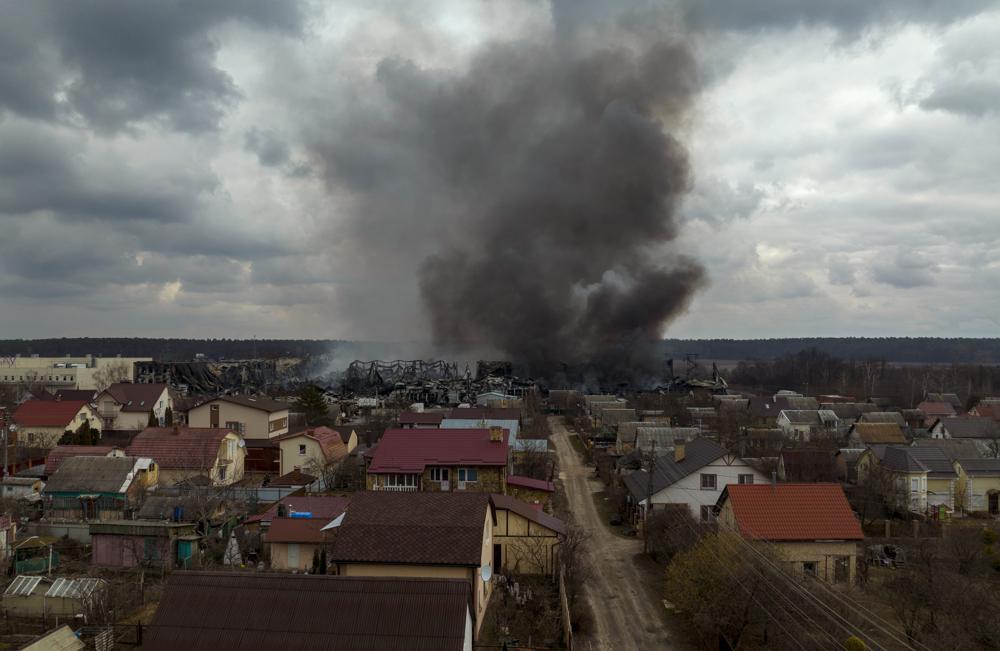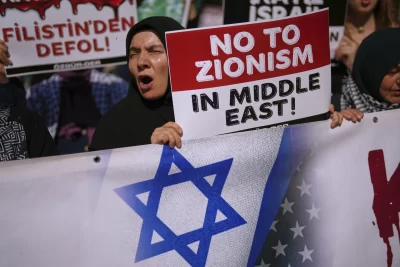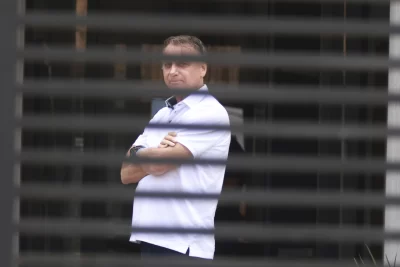
The International Atomic Energy Agency has said Russian forces are tightening their grip on the Zaporizhzhya nuclear plant, Ukraine’s largest, that they seized last week.
The director general of the agency, Rafael Mariano Grossi, said Sunday Ukrainian staff members are now required to seek approval for any operation, even maintenance, from the Russians, and that they have impeded normal communications by switching off some mobile networks and internet at the site.
Ukraine’s regulatory authority said that phone lines, as well as e-mails and fax, are no longer working. Grossi said he is “extremely concerned about these developments,” adding that for the plant to operate safely, “staff must be allowed to carry out their vital duties in stable conditions, without undue external interference or pressure.
NEW YORK — The Russian military has warned Ukraine’s neighboring countries from hosting its warplanes, saying Moscow may consider them a part of the conflict if Ukrainian aircraft fly combat missions from their territory.
Russian Defense Ministry spokesman Igor Konashenkov charged Sunday that some Ukrainian combat planes had redeployed to Romania and other Ukraine neighbors he didn’t identify.
Konashenkov warned that if those warplanes attack the Russian forces from the territory of those nations, it “could be considered as those countries’ engagement in the military conflict.”
PARIS — The French presidency said the call between Russian President Vladimir Putin and French President Emmanuel Macron on Sunday focused primarily on the safety of Ukraine’s nuclear plants.
The call was on request from Macron and lasted almost two hours, the Elysee said.
A French official said Macron insisted on the need to ensure the International Atomic Energy Agency’s safety standards are respected at Chernobyl and in other nuclear plants. He told Putin these facilities must not be targeted by a Russian offensive or caught in the fighting.
Putin said he does not intend to attack nuclear plants and agreed on the principle of a “dialogue” between IAEA, Ukraine and Russia on this issue, according to the official, who spoke anonymously in line with the French presidency’s practices. Potential talks are to be organized in the coming days, he said.
Macron reiterated his call for Russia to stop its military operations and insisted on the need to protect the civilians and allow access to humanitarian aid.
“The (humanitarian) situation is difficult” including in Mariupol on Sunday, the official stressed. “Our demands remain the same: we want Russia to respond to these demands… very quickly and clearly.”
— By Sylvie Corbet
PARIS — European Union leader Charles Michel said Sunday closing Ukraine’s airspace could spark a world war.
Ukrainian President Volodymyr Zelenskyy has repeatedly called on NATO countries to stop the Russian onslaught on his country by imposing a no-fly zone. Western leaders have refused for fear of triggering a wider war in Europe. Deploying fighter jets over Ukraine could “in current circumstances” be considered as “NATO’s entry into the war and therefore risk World War III,” Michel said in an interview with the public broadcaster France Inter.
Michel denied that economic sanctions against Russia constitute “a war of the EU or NATO against Russia.” Russian President Vladimir Putin has linked the West’s economic punishment for his invasion of Ukraine to “declaring war” on Moscow.
Michel said European and American allies imposed sanctions “to create pressure and hurt the (Russian) regime”, not the people.
__
JERUSALEM — A group of 100 Ukrainian Jewish orphans who were evacuated from the country after Russia invaded have landed in Israel.
The children arrived Sunday a few hours before two flights carrying around 300 other Ukrainian Jewish immigrants landed.
The children were evacuated from the central Ukrainian city of Zhytomyr and brought to Israel by the KKL-JNF organization.
The Jewish Agency for Israel, a quasigovernmental organization that manages immigration affairs, said that it had received 5,500 urgent requests by Ukrainian Jews to move to Israel since Russia attacked on Feb. 24.
__
WASHINGTON — U.S. Secretary of State Antony Blinken says the United States and its allies are having a “very active discussion” about banning the import of Russian oil and natural gas in the latest escalation of their sanctions in retaliation for its invasion of Ukraine.
Asked about oil and gas imports, Blinken told CNN on Sunday that President Joe Biden convened a meeting of his National Security Council on the subject the day before. Biden and Western allies have until now held off on sanctions against Russia’s lucrative energy industry to avoid blowback on their own economies.
“We are now talking to our European partners and allies to look in a coordinated way at the prospect of banning the import of Russian oil while making sure that there is still an appropriate supply of oil on world market,” said Blinken. “That’s a very active discussion as we speak.”
BERLIN — The U.N. human rights office says it has confirmed the deaths of 364 civilians in Ukraine since the Russian invasion began on Feb. 24.
The Geneva-based office said that another 759 civilians had been injured as of midnight Saturday.
The rights office uses strict methodology and only reports casualties it has confirmed.
It says it believes the real figures are considerably higher, “especially in government-controlled territory and especially in recent days.” That’s because the flow of information has been delayed amid the fighting and many reports still need to be corroborated.
Ukrainian officials have presented far higher numbers.
NEW YORK — The Kremlin says President Vladimir Putin told his Turkish counterpart that Russia’s military action in Ukraine could be halted “only if Kyiv ceases hostilities and fulfills the well-known demands of Russia.”
Putin has listed “demilitarization” and “denazification” of Ukraine, recognition of Russian-annexed Crimea as part of Russia and separatist regions in eastern Ukraine as independent states as the Kremlin’s main demands.
According to the readout of Sunday’s call with Turkish President Recep Tayyip Erdogan, “hope was expressed that during the planned next round of negotiations, the representatives of Ukraine would show a more constructive approach, fully taking into account the emerging realities.”
A third round of talks is scheduled for Monday.
MEDYKA, Poland — The head of the United Nations’ refugee agency says the international Red Cross and the U.N. are negotiating access to the cities in Ukraine most impacted by fighting since Russia invaded Feb. 24.
Filippo Grandi, the U.N. high commissioner for refugees, said Sunday that “those discussions continue” with hope for success, but didn’t name specific cities. He said during a visit to Poland’s border with Ukraine that “these corridors are mainly to bring humanitarian goods basic goods to people that are really in desperate need and also to extract maybe the most vulnerable people.”
Grandi stressed that wide international assistance is needed for Poland and other countries receiving refugees from Ukraine. He said that “predictions are difficult, hundreds of thousands are on the move inside Ukraine, and it is very likely that we will see a large influx continuing in the next few days.” Earlier Sunday, he said that more than 1.5 million people have already fled Ukraine for neighboring countries.
Grandi said that “what is needed really is a ceasefire, is the end to hostilities because that’s the only way to stop this tragedy.”
LVIV, Ukraine — A Ukrainian official says a second attempt to evacuate civilians from a southern city under siege for a week has failed due to continued Russian shelling.
Ukrainian military authorities said earlier Sunday that evacuations from the port city of Mariupol were scheduled to begin at noon local time (10 a.m. GMT) during a 10 a.m. to 9 p.m. local ceasefire.
Interior Ministry adviser Anton Gerashchenko said the planned evacuations along designated humanitarian corridors were halted because of an ongoing assault.
He said on Telegram that “there can be no ‘green corridors’ because only the sick brain of the Russians decides when to start shooting and at whom.”
A similar cease-fire planned for Mariupol and the nearby city of Volnovakha collapsed Saturday, trapping residents under more shelling and aerial bombardment by Russian forces.
ISTANBUL — Turkish President Recep Tayyip Erdogan’s office says he has called for an urgent cease-fire in Ukraine in a telephone conversation with Russian President Vladimir Putin.
In a statement following Sunday’s one-hour call, the Turkish presidency said Erdogan had urged a halt to fighting to “address humanitarian concerns” and “seek a political solution” to the conflict. The war is now in its 11th day.
Erdogan called for the opening of humanitarian corridors and a peace agreement between Russia and Ukraine.
Turkey has extensive ties with both Russia and Ukraine and has sought to place itself as a mediator. It has invited both to a diplomatic forum in Antalya next week.
Erdogan’s office said he told Putin that he was “ready to make every contribution” to resolving the crisis.
WARSAW, Poland — Poland’s border guard agency says that over 922,000 refugees have crossed the border from Ukraine since Feb. 24, when Russia launched its invasion.
The agency said on Twitter that a record one-day number of over 129,000 crossed into Poland on Saturday, and almost 40,000 between midnight and 7 a.m. on Sunday.
A nation of some 38 million people, Poland is receiving the largest number of refugees among Ukraine’s neighbors. Some who entered Poland have continued to other countries.
The head of the United Nations’ refugee agency said Sunday that more than 1.5 million refugees have crossed from Ukraine into neighboring countries since Russia invaded.
SIRET, Romania — Romania’s border police say more than 227,000 Ukrainian citizens have entered Romania in total since the crisis began and more than 155,000 of them have already left the country.
During a visit on Saturday to Romania’s northern border at Siret, Romanian President Klaus Iohannis said that “no Ukrainian will be denied entry into Romania.”
He said Romanian authorities believe that the situation “will continue for a long time, and the complications will worsen.” The president added: “We believe that this humanitarian catastrophe will spread, that a lot of help will be needed here, but also in Ukraine.”
VATICAN CITY — Pope Francis says he has dispatched two cardinals to Ukraine, a highly unusual move.
The pontiff said Sunday that “the Holy See is willing to do everything to put itself in service for peace.” The papal almsgiver, Cardinal Konrad Krajewski, has been dispatched with aid, along with Cardinal Michael Czerny, who is head of the papal office that deals with migration, charity, justice and peace.
Francis did not say where exactly the cardinals had gone, but said they represented him and all Christian people with the message that “war is madness.”
Referring to Ukraine as “that martyred country,” Francis called for a cessation of violence, the establishment of humanitarian corridors and a return to negotiations.
“In Ukraine, rivers of blood and tears are flowing. This is not just a military operation, but a war that sows death, destruction and misery,” he said in his traditional Sunday blessing.
HELSINKI — The top U.S. military officer says Ukrainian soldiers and civilians alike have put up an “extraordinarily courageous” fight since the Russian invasion.
Gen. Mark Milley, Chairman of the Joint Chiefs of Staff, spoke Sunday during a visit to an air base in Amari, Estonia. He is visiting the three Baltic nations to pledge U.S. and NATO support to Estonia, Latvia and Lithuania, former Soviet republics that border Russia.
Milley said that “the will of the Ukrainian people, the importance of their national leadership and the fighting skills of the Ukrainian army has come through loud and clear.”
He said Ukrainians have put up “an extraordinarily courageous and brave fight” and “they’ve been doing very, very well. But it’s a little bit early to draw any definitive lessons.”
Milley said the U.S. currently has no indications that Moscow is planning to attack on the Baltic countries and “we want to make sure it stays that way.”
TEL AVIV, Israel — Israel’s prime minister says his country will continue to assist in finding a diplomatic solution to the Ukraine crisis, even if the chances for success are few.
Naftali Bennett spoke Sunday to a meeting of his Cabinet, hours after he returned from a surprise meeting with Russian President Vladimir Putin in Moscow, where the two discussed the war with Ukraine. He then traveled to Germany where he met Chancellor Olaf Scholz.
Bennett revealed no details from his talks with Putin, but called the country’s mediation efforts “our moral duty.” Earlier, his office said he and Ukrainian President Volodymyr Zelenskyy spoke by phone Sunday morning, the third such call between the two leaders over the past day.
Bennett also told his Cabinet Israel was readying for a wave of Jewish immigration from Ukraine. Israel is also preparing to allow entry to a small number of non-Jewish Ukrainians fleeing the conflict.
Israel is one of the few countries that has good working relations with both Russia and Ukraine.
__
BERLIN — The head of the United Nations’ refugee agency says that more than 1.5 million refugees have crossed from Ukraine into neighboring countries since Russia invaded.
Filippo Grandi, the U.N. high commissioner for refugees, tweeted on Sunday that it is “the fastest growing refugee crisis in Europe since World War II.”
His agency didn’t immediately give a more precise update on the refugee figures. Grandi is visiting countries that border Ukraine.
PRAGUE — Radio Free Europe/Radio Liberty says it has suspended its operations in Russia after Moscow intensified a crackdown on what it deems to be “fake” reports and tax authorities initiated bankruptcy proceedings against it.
The U.S.-funded, Prague-based broadcaster’s president and chief executive, Jamie Fly, said “this is not a decision that RFE/RL has taken of its own accord, but one that has been forced upon us by the Putin regime’s assault on the truth.”
The broadcaster, which has had a physical presence in Russia since 1991, plans to continue reporting on Russia and the war in Ukraine from abroad.
The announcement came after Russia on Friday passed a law foreseeing prison sentences of up to 15 years for spreading what is deemed to be fake information about its armed forces.
In addition, RFE/RL said that Russian authorities initiated bankruptcy proceedings on Friday. It said it is seeing “the culmination of a years-long pressure campaign against RFE/RL.”
___
CHISINAU, Moldova – U.S. Secretary of State Antony Blinken is in Moldova pledging America’s support to the small Western-leaning former Soviet republic that is coping with an influx of refugees from Ukraine and warily watching Russia’s intensifying war with its neighbor.
Blinken was meeting on Sunday with senior Moldovan officials who are appealing for international assistance in dealing with more than 120,000 refugees from Ukraine that it is now hosting while also seeking security reassurances against potential Russian aggression. More than 230,000 people have fled into Moldova from Ukraine since the war began 11 days ago.
Blinken said Moldova’s welcoming of refugees is an inspiration to the world.
“We admire the generosity of hospitality, the willingness to be such good friends to people who are in distress, and, indeed, I want to do everything we can to help you deal with the burden that this has imposed,” he said.
Russia already has troops in the country of 2.6 million that are stationed in the disputed territory of Transnistria and are being closely watched as Russian President Vladimir Putin presses ahead with the invasion of Ukraine. Although it has no plans to try to become a member of NATO, Moldova formally applied to join the European Union just three days ago in a fast-track bid to bolster its ties with the West.




